Józef Piłsudski himself admitted that women were "the most zealous propagators of his name". There are many examples. But this one is really worth knowing.
Women associated with the rifle movement and the Legions took on the duties of tireless propagandists from the very first days of the war. They built the reputation of the Polish army and its commanders.
They were visible in the front services, where they tried to persuade civilians to help and volunteer, in the editorial offices of underground magazines, where they were responsible for printed matter reaching tens of thousands of recipients, and finally - in various legal and underground organizations, comprehensively supporting the military act.
They worked tirelessly on various fronts. However, a particularly important stage of their activity came at the time of the deepest crisis:after the German authorities decided in the summer of 1917 to detain Józef Piłsudski and to deport legionnaires who did not want to serve in the "Polish Wehrmacht" to internment camps.
There was a real wave of indignation in response to these shameful decisions. Thousands of women gathered in independence organizations demanded the release of the Commander and the interned legionnaires. They did not stop there by any means. They started to print memorials and appeals, persuaded representatives of city, poviat and commune councils to revolt ... They spoke uncompromisingly against the occupiers who had just called themselves liberators.
Three thousand signatures
Zofia Zawiszanka was particularly active in the territory of the Austrian occupation: former shooter and soldier of the Women's Intelligence Department and now peowiaczka.
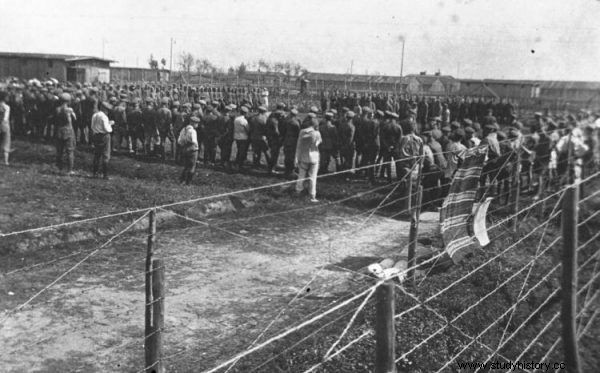
Polish legionnaires interned in the camp in Szczypiorno
In her memoirs, she reported that, after hearing about Piłsudski's detention, despite the harvest and heavy rain, she managed to gather a crowd of several thousand in a village near Miechów, who listened to her "work of hardship". Then, female activists developed a "feverish campaign of collecting signatures" under a hastily (of course by the ladies) protest:
We consider the arrest and imprisonment by the Germans of the Polish soldier a heavy insult to our nation. As citizens, regardless of shades of political and social beliefs, we are protesting against this rape!
Both Central States solemnly vouched for Independence, so both are jointly responsible for the imprisonment of the One who only fought for this idea all his life. We demand that Józef Piłsudski be released immediately!
This address to the authorities was signed by almost three thousand people. And yet it was only one document, arranged in one poviat north of Krakow. There was a multitude of similar memorials. And most of the time history was repeating itself.
It was women, in the words of Joseph himself, who were "in general the most ardent propagators of his name." They were the loudest and most decisive ones against the authorities. They finally initiated the last stage of building the Commander's image. The long road from zero to hero was coming to an end. Anyway - not even to a hero, but to a superhuman hero. Polish Heracles of semi-divine power.
Piłsudski is a tough chick
The same Zofia Zawiszanka, who collected protest signatures near Miechów, was also responsible for creating one of the earliest, and at the same time the most enthusiastic, propaganda brochures strictly devoted to Józef Piłsudski.
The publication, published under the pseudonym of Zofia Przeorowa, was proudly entitled "Our Chief". It appeared in 1917, after the detentions, and of course - in the second circulation. The author opened it with a really high note. At the start, she decided to prove that Piłsudski is ... an exceptionally tough chick.
"Even children know and understand the tale of the seven canes that could not break when they were tied together, although each of them was easy to break," she explained. Seemingly, to show the great importance of cooperation between people and joint pursuit of a goal. However, she immediately countered her own suggestion:"But people are not chicks, they are not all the same." According to Zawiszanka, truly hard, indestructible poles almost never happened. While it was possible to meet extraordinary individuals, truly "great" people were unique.
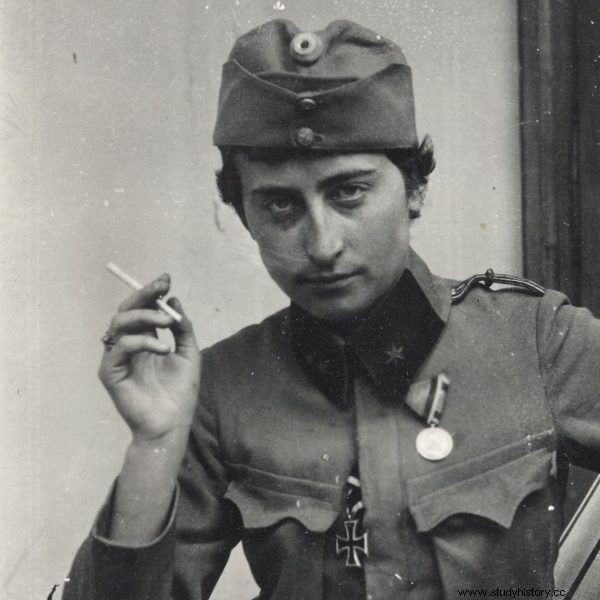
Zofia Zawiszanka - the first intelligence officer sent to the territories annexed by Russia after the outbreak of the war. Here, in a military uniform borrowed from a friend, Janusz Gąsiorowski.
"A great man is like a giant among dwarfs, as if an oak grows among a poor shrub" - explained the author with pathos. - “There is some strange strength in him, as if miraculously given by the Holy Spirit. God's spark from which fires are kindled to enlighten and warm the whole earth ”. The task of the people was to recognize the "giant" in their surroundings. And when they see him, give yourself wholeheartedly to him, without the slightest hesitation. It was:
(…) Follow him with as much confidence as your children would follow your beloved teacher. Because he knows best what is good for the nation and what is harmful, sometimes he even has the gift of clairvoyance for the future and warns against dangers. It is also unhappy nations that do not listen to their great people and do not let them make themselves happy.
The fourth great
Throughout Polish history, Zofia Zawiszanka was able to identify only four such heroes. There was Casimir the Great, who "found Poland wooden and left it brick". After him came Stefan Batory, "with a strong hand braking the impudent and stupid nobility".
Tadeusz Kościuszko is said to have deserved the name of a really great man next. "Beloved Chief, to whom all unanimously granted supreme power in the uprising against the Muscovites." And at the same time a commander who "deserved such love and honor that he was buried in the tombs at Wawel together with the kings". Another century had to wait for the fourth hero. "He appeared" - as Zawiszanka wrote - "only today". And it was of course Józef Piłsudski.
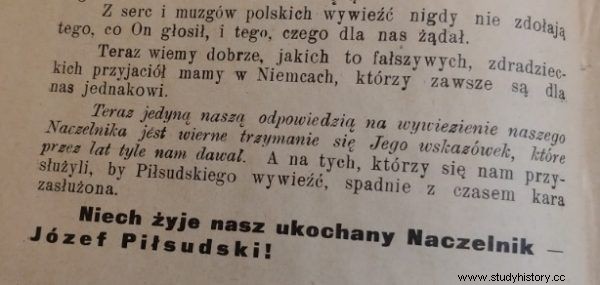
Excerpt from the last page of Our Governor's brochure.
Zawiszanka's publication perfectly matched the rules of propaganda. The author, who had years of agitation among peasants behind her, knew that the image of the Leader had to be simple, unambiguous; must bring to mind holy pictures and biblical parables. She wrote about Piłsudski that he came from a family that has always been characterized by great "domestic virtues" and "willingly giving up everything for the sake of the Fatherland".
She emphasized his diligent schooling, devotion to his parents, great patriotism, which he drank with his mother's milk ... . "He told himself that he would live only to turn his battered countrymen into free people," wrote Zawiszanka loftily, but in fact also without resorting to lies.
On the other hand, she simplified and bent the reality when it was necessary. She removed all dilemmas, failures, fears and jitters in life. Piłsudski acted alone, on his own initiative and without any help. Because he was an unbreakable cane. If it was not fully successful, it was only the fault of outsiders. If people followed him, Kadrówka would drive the Muscovites out of Poland immediately, saving the country from destruction and poverty. If the Austrians did not reject his demands, they would have hundreds of thousands of soldiers at their service ...
Zawiszanka argued that the Commander's dismissal in the summer of 1916 made the occupiers “pale fear”. Then, only under the pressure of the ousted Brigadier ... they decided to declare a facade of Polish independence. If someone said otherwise, he was repeating "falsehoods and stupidities".

Learn about the fate of women who won independence for Poland, and for themselves - freedom, voting rights and the dignity that have always been denied them. The latest book by Kamil Janicki, 'Niepokorne damy. Women who won an independent Poland ”now available for sale!
Who is smarter than him in Poland?
At the decisive moment, one and only man fought for the appointment of Polish authorities and offices. A man "wise, brave and as toughened as iron." Needless to say who exactly.
The Germans and Austrians have found out that without him nothing can be done in Poland.
It can be said that He is the soul of the struggle for the rights of the nation, He stimulates it and strengthens it to a hard fight for Poland - without looking for any glory for himself, sometimes hiding even his own merits.
And we are also not concerned with praising our dearest Warden. There will be time for that when the fight is over. If we write about His deeds, it is only to open people's eyes and show them clearly who to follow in these difficult times.
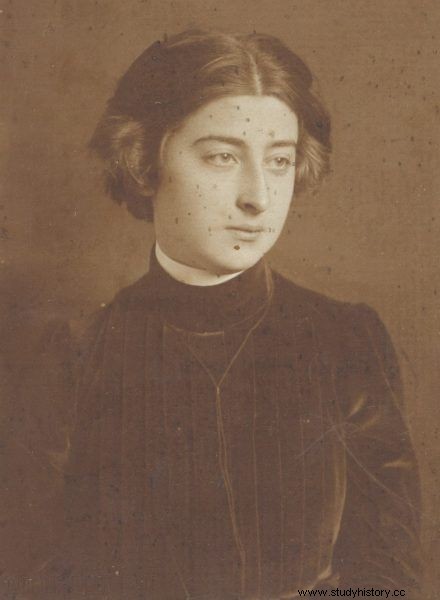
Zofia Zawiszanka in a photo from her youth.
"What to beat around the bush?" Zawiszanka asked rhetorically. The "rational" one should admit that he has little abilities, that he can do little, and that ... he is clever only enough to follow the leader blindly. After all, such a great man was given to Poles by “God and to them he revealed his great mercy”.
Judge for yourself:is there anyone in Poland wiser than him, cleaner in heart and stronger in action? Is it worth listening to? Is he or is he not that man sent by God to save the nation?
And if it is - woe to those who disturb him! - like the city of Jerusalem which has stoned the prophets. Whoever does not help him in his toil, does not want to work on improving his own good. Whoever throws stones under his feet, he pushes the emerging Homeland back into the tomb.
Although the prophet was imprisoned, all the more so, it was necessary to ensure that "what he proclaimed and what he asked for us" would never disappear from Polish "hearts and brains". You had to resist the "false, treacherous friends" of Germany. And wait for the return of the only man who has the power to bring Poland to freedom and take the reins of governments into his own hands.
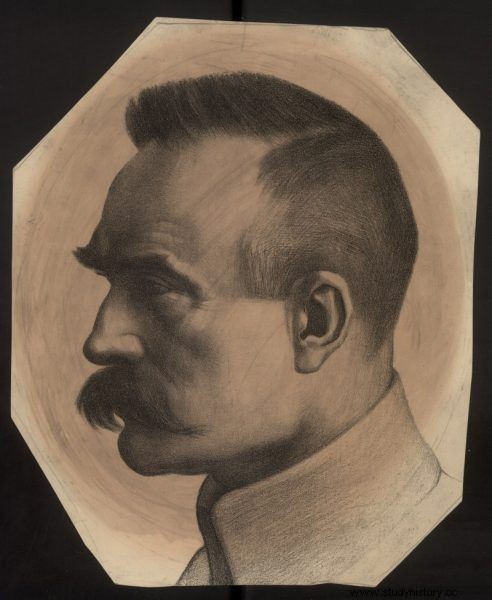
Józef Piłsudski on the lithography of Adam Grabowski
Who doesn't help him in his labors…
Did Zawiszanka know that she was manipulating reality? That he falsifies Piłsudski's image and that he is in fact not a new Abraham, but an ordinary man, with enormous weaknesses and painfully sexist views? Of course, she had to be fully aware of that. At the same time, however, she was deeply convinced that the idealized, partly created by herself Commander, Poles needed.
If the countrymen were to shake off their impotence, they had to believe in the existence of the new Casimir the Great, Stefan Batory and Tadeusz Kościuszko in one. In the "beloved Chief" who will not fear the dark ... and who will come back at the right moment to rebuild a free homeland.
Without this brochure and similar publications, without the great involvement of hundreds of different Zofia Zawiszanek, on November 10 Piłsudski would be only one of the numerous contenders for power in the country. A politician of a secondary or even third level. Thanks to them was returning from the German fortress already in a completely different will:as the only man to whom the Poles were ready to hand over power in the country.
